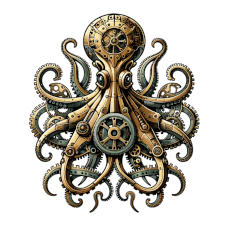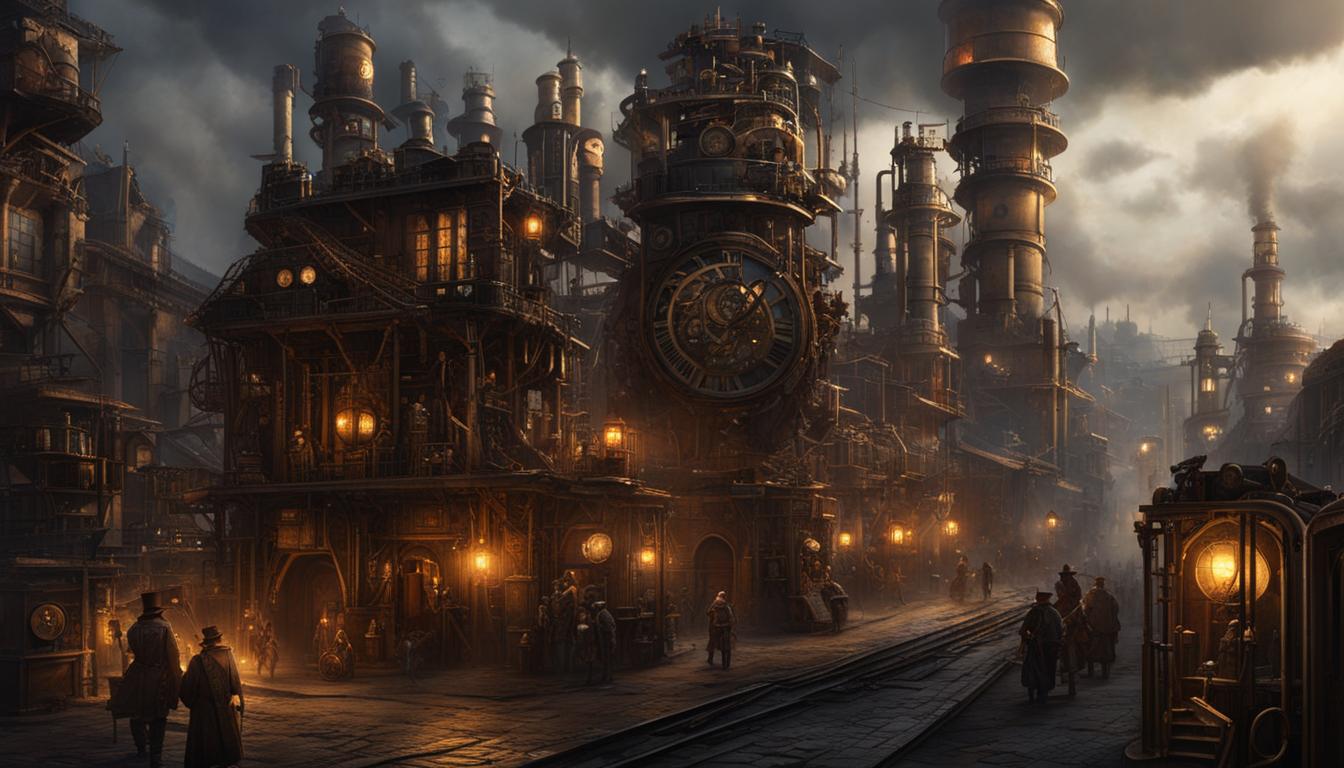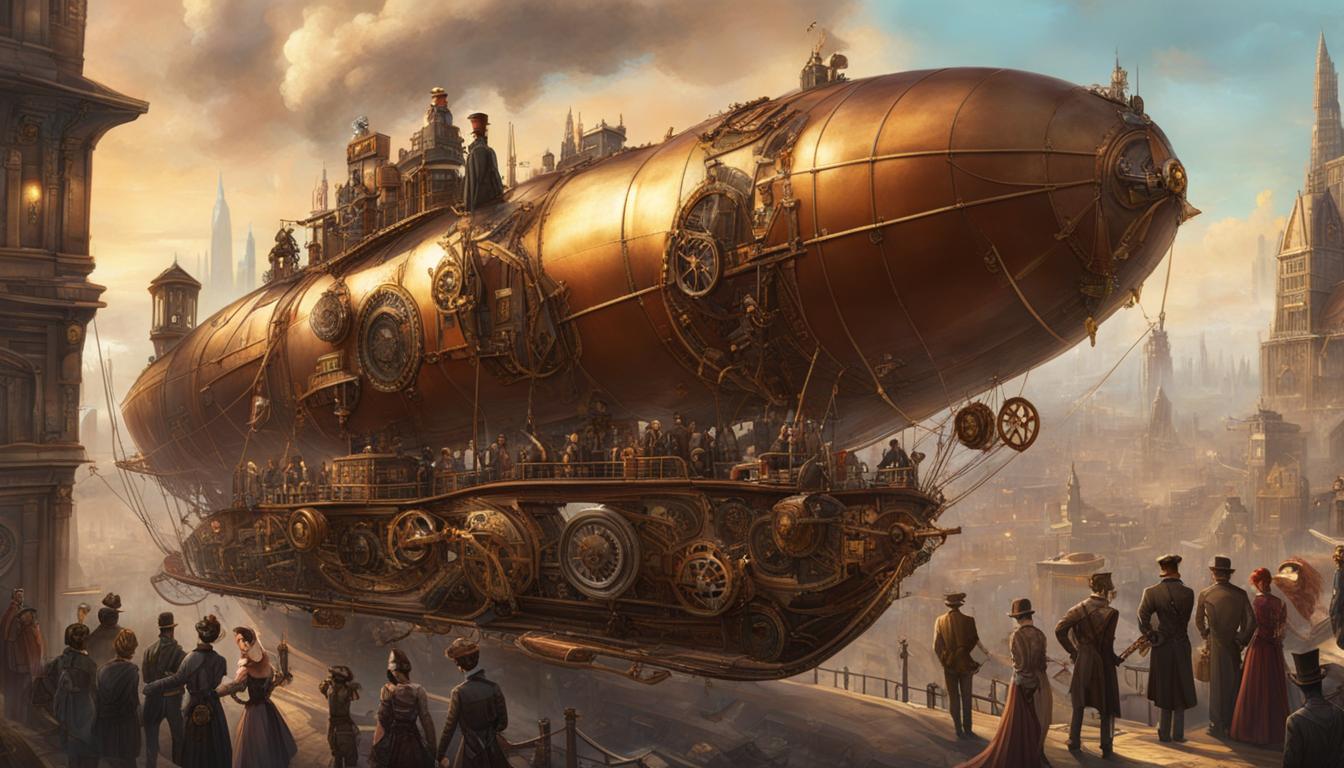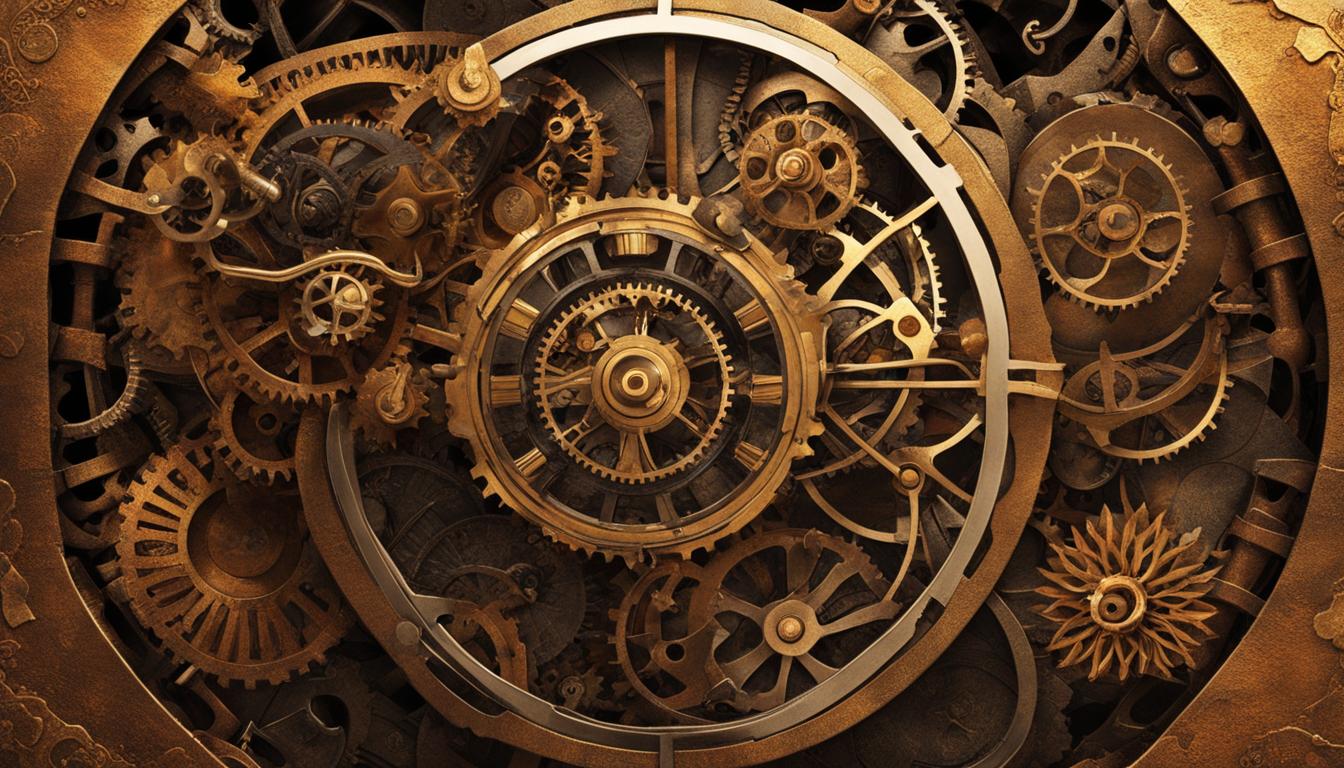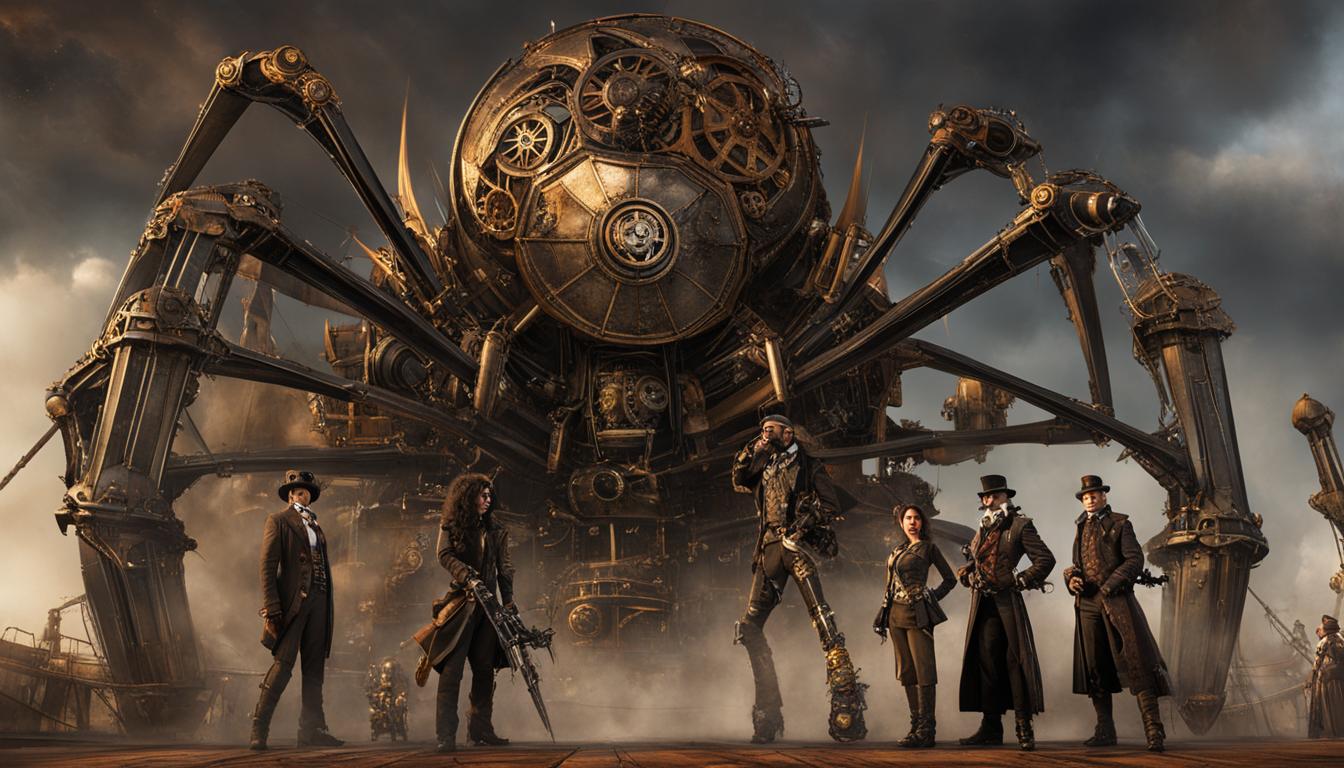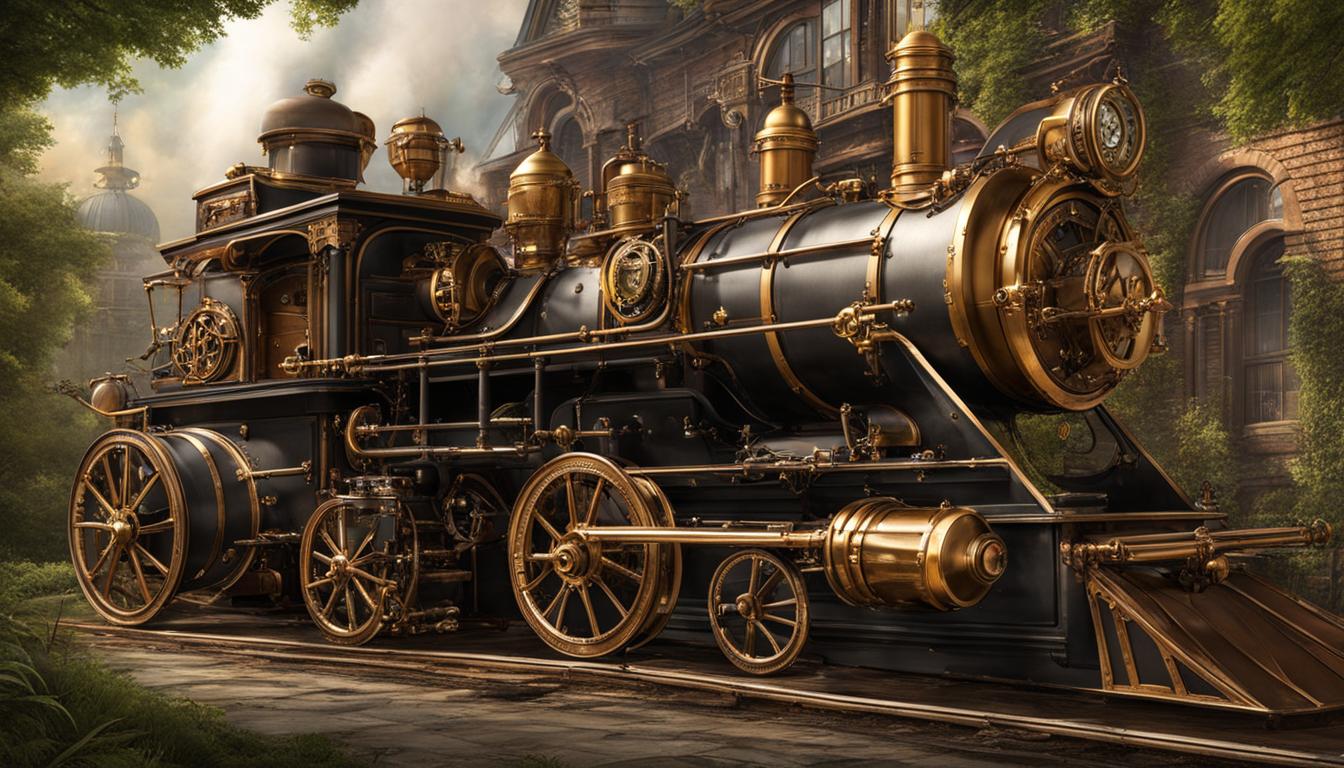In the world of Steampunk, history takes on a whole new dimension. It’s a realm where fate and free will collide, and the course of history is not set in stone. Steampunk enthusiasts believe that human choices and technological innovations have the power to shape the trajectory of historical events. It’s a philosophy that challenges the notion of predetermined history and offers a fresh perspective on our perceptions of the past.
Key Takeaways
- Steampunk challenges the idea of predetermined history, emphasizing the role of human agency in shaping historical events.
- Technological advancements play a significant role in steampunk’s exploration of alternative historical narratives.
- Steampunk encourages a critical examination of the factors that shape our understanding of the past.
- The steampunk community engages in ongoing discussions and debates surrounding concepts of destiny and determinism.
- By highlighting the power of human intervention, steampunk offers a unique lens through which to view the course of history.
Steampunk’s perspective on historical determinism challenges traditional views of predetermined history and encourages a deeper exploration of the complexities of the past. Whether one believes in the inevitability of history or the power of human intervention, diving into the realms of steampunk broadens our understanding of the intricate interplay between fate and free will.
Steampunk’s Philosophical Views on Historical Paths
Steampunk ideology challenges the notion of predetermined history and delves into the complex interplay between fate and free will. According to steampunk enthusiasts, historical determinism is not a fixed concept, but rather a subject of human agency and technological advancements. In their beliefs, the direction of history is not predetermined, and individuals have the power to shape the course of events through innovation and creativity.
The steampunk perspective encourages a critical examination of the factors that shape our understanding of the past. It rejects the traditional view of historical inevitability and emphasizes the importance of individual choices and inventions in altering the trajectory of history. This philosophy offers a unique lens through which to explore our perceptions of the past, challenging mainstream narratives and opening up new possibilities.
Steampunk challenges the idea that historical paths are inherently inevitable, highlighting the role of human intervention and technological advancements in shaping the course of events. It encourages us to question the predetermined nature of history and recognize the potential for change.
By questioning the inevitability of history, steampunk sparks discussions and debates within its community. Some argue for the predetermined nature of historical events, while others emphasize the power of human agency. These ongoing conversations reflect the diversity of perspectives within the steampunk subculture and contribute to the ongoing exploration of historical determinism.
| Steampunk’s Beliefs | Predetermined History | Fate and Free Will |
|---|---|---|
| Rejects the idea of predetermined history | Emphasizes the role of human agency | Recognizes the influence of technological advancements |
| Encourages critical examination of historical narratives | Challenges the traditional view of historical inevitability | Promotes individual choice and innovation |
| Sparks discussions on the nature of historical determinism | Explores the potential for human intervention in shaping history | Encourages a reevaluation of our understanding of the past |
The steampunk subculture offers a unique perspective on the course of history, suggesting that it is not a linear progression but a dynamic process shaped by human actions. It calls for a reevaluation of our understanding of the past and the potential for reshaping the future. Whether one embraces the concept of predetermined history or believes in the power of human intervention, exploring steampunk’s philosophical views on historical paths provides a thought-provoking lens through which to examine our perceptions of the past and present.
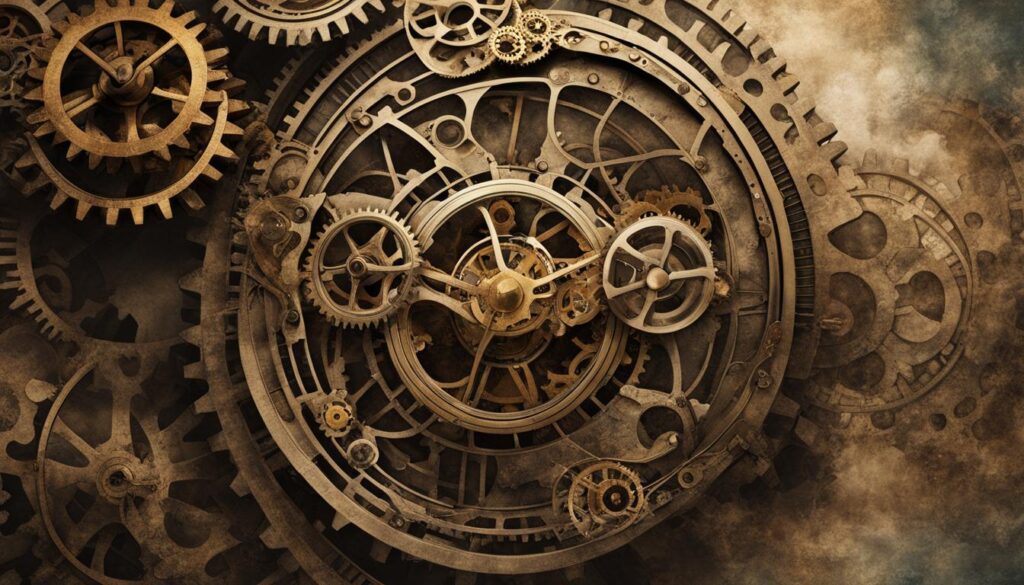
Steampunk’s Take on Destiny and Fate
Steampunk offers a nuanced perspective on destiny and fate, challenging the notion that historical events are solely predetermined. This unique aesthetic and philosophy emphasize the role of human intervention, technological advancements, and societal shifts in shaping the course of history. Steampunk enthusiasts believe that while external forces may exist, individuals and their choices have the power to influence the outcome of historical events.
“The future is not set in stone,” says renowned steampunk author, Emily Aetherwright. “Steampunk encourages us to question the inevitability of history and recognize our agency in shaping the world around us.”
By rejecting the idea of fatalistic determinism, steampunk opens up a world of possibilities where alternative narratives can emerge. This philosophy encourages active engagement with the past, inspiring individuals to challenge conventional historical interpretations and consider the potential for change.
Steampunk’s Perspective on Individual Agency
At the heart of steampunk lies a belief in the importance of individual agency. Steampunk enthusiasts view themselves as inventors and creators, embodying the spirit of innovation that can alter the course of history. They believe that through ingenuity and creativity, individuals can defy the constraints of fate and shape their own destiny.
Steampunk’s rejection of fatalistic determinism is not a denial of external influences but rather an assertion of individual responsibility. It encourages a critical examination of historical events, highlighting the impact of human choices and technological advancements in shaping the world we live in today.
| Steampunk Beliefs | Traditional Beliefs |
|---|---|
| History is malleable and subject to change. | History follows a predetermined path. |
| Human agency plays a significant role in shaping historical events. | Historical events are dictated by external forces and individual agency is limited. |
| Technological advancements can alter the course of history. | Technological advancements are secondary to historical trends. |
Steampunk’s perspective on destiny and fate challenges conventional wisdom, offering a thought-provoking alternative to traditional views of historical inevitability. Whether one embraces the idea of human agency or believes in the predetermined nature of history, exploring the depths of steampunk’s philosophical musings broadens our understanding of the complexities surrounding the course of history.
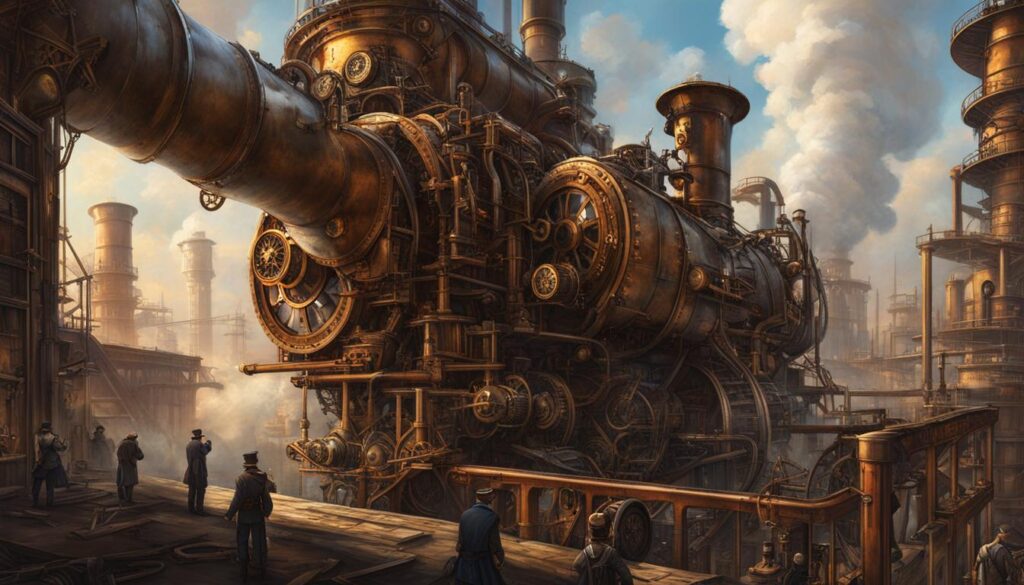
By examining alternative historical narratives and imagining worlds shaped by technological advancements, steampunk literature, art, and fashion highlight the importance of human agency and the potential for reshaping the future. This philosophy challenges the traditional belief in the predetermined nature of historical fate, encouraging individuals to actively engage with the past and present to influence the direction of historical events.
Steampunk’s View on Historical Determinism
Within the steampunk community, there are ongoing discussions and debates surrounding destiny and determinism in history. Some argue that historical events are largely predetermined, with individuals merely playing their assigned roles. However, others stress the power of human agency and the ability to shape the course of history through innovation and creativity.
“Steampunk invites us to reconsider our understanding of history and challenges the notion that it is an inevitable march towards a predetermined future. It encourages critical thinking and a reevaluation of the factors that shape our perception of the past,” says renowned steampunk scholar Dr. Emily Fletcher.
These discussions reflect the diversity of perspectives within the steampunk subculture, contributing to an ongoing exploration of historical determinism. Steampunk’s beliefs on the inevitability of history offer a thought-provoking and inspiring viewpoint that invites individuals to question and reshape their understanding of the past and its enduring relevance.
Conclusion
Steampunk’s take on historical determinism challenges the conventional belief in the inevitability of history. It offers a unique perspective that emphasizes the significance of human agency, technological advancements, and alternative narratives in shaping the course of historical events. Whether one believes in the power of human intervention or the predetermined nature of history, exploring the philosophical depths of steampunk’s perspective broadens our understanding of the complexities of the past and its ongoing relevance.
By questioning the notion of predetermined history, steampunk enthusiasts encourage a critical examination of the factors that influence our understanding of the past. They reject the idea that historical events are solely determined by fate, instead emphasizing the role of individual actions and inventions in shaping the course of history.
Steampunk’s beliefs on the inevitability of history challenge traditional views and open up a world of possibilities. This unique subculture invites us to explore the intersections of technology, creativity, and human agency, as we reconsider the historical narratives that shape our understanding of the past. Whether you are drawn to the idea of a predetermined fate or the potential for innovation and change, steampunk’s perspective on historical determinism sparks a thought-provoking journey into the depths of history.
FAQ
What is steampunk’s perspective on historical determinism?
Steampunk challenges the notion of predetermined history by emphasizing the role of human choices and inventions in shaping the course of events.
Does steampunk believe in the inevitability of historical events?
No, steampunk enthusiasts believe that the direction of history is not predetermined and can be altered through innovation, creativity, and individual agency.
How does steampunk view destiny and fate?
Steampunk rejects the idea that historical events are solely predetermined and emphasizes the importance of human intervention and societal shifts in shaping the course of history.
What themes related to historical determinism can be found in steampunk?
Steampunk often presents alternative historical narratives, imagining worlds where technological advancements and different choices reshape the course of events.
Are there discussions in the steampunk community regarding destiny and determinism?
Yes, there are ongoing discussions and debates surrounding the concepts of destiny and determinism, reflecting the diversity of perspectives within the steampunk subculture.
How does steampunk view the course of history?
Steampunk suggests that history is not a linear progression but rather a dynamic process shaped by human ingenuity and choices.
Does steampunk believe in the inevitability of history?
Steampunk enthusiasts question the idea of historical inevitability and emphasize the role of human actions and inventions in shaping historical events.
